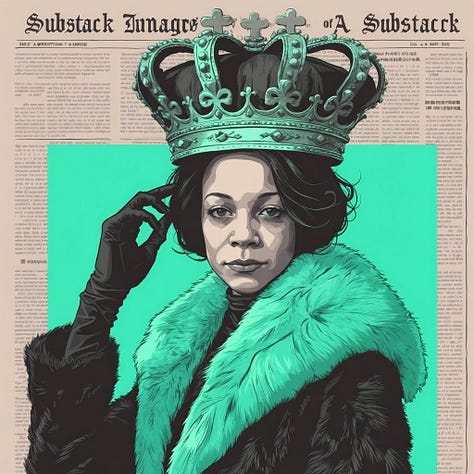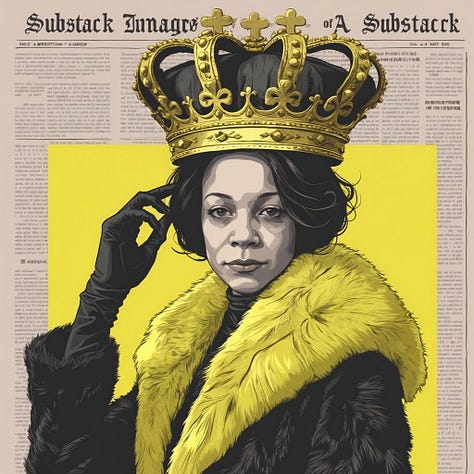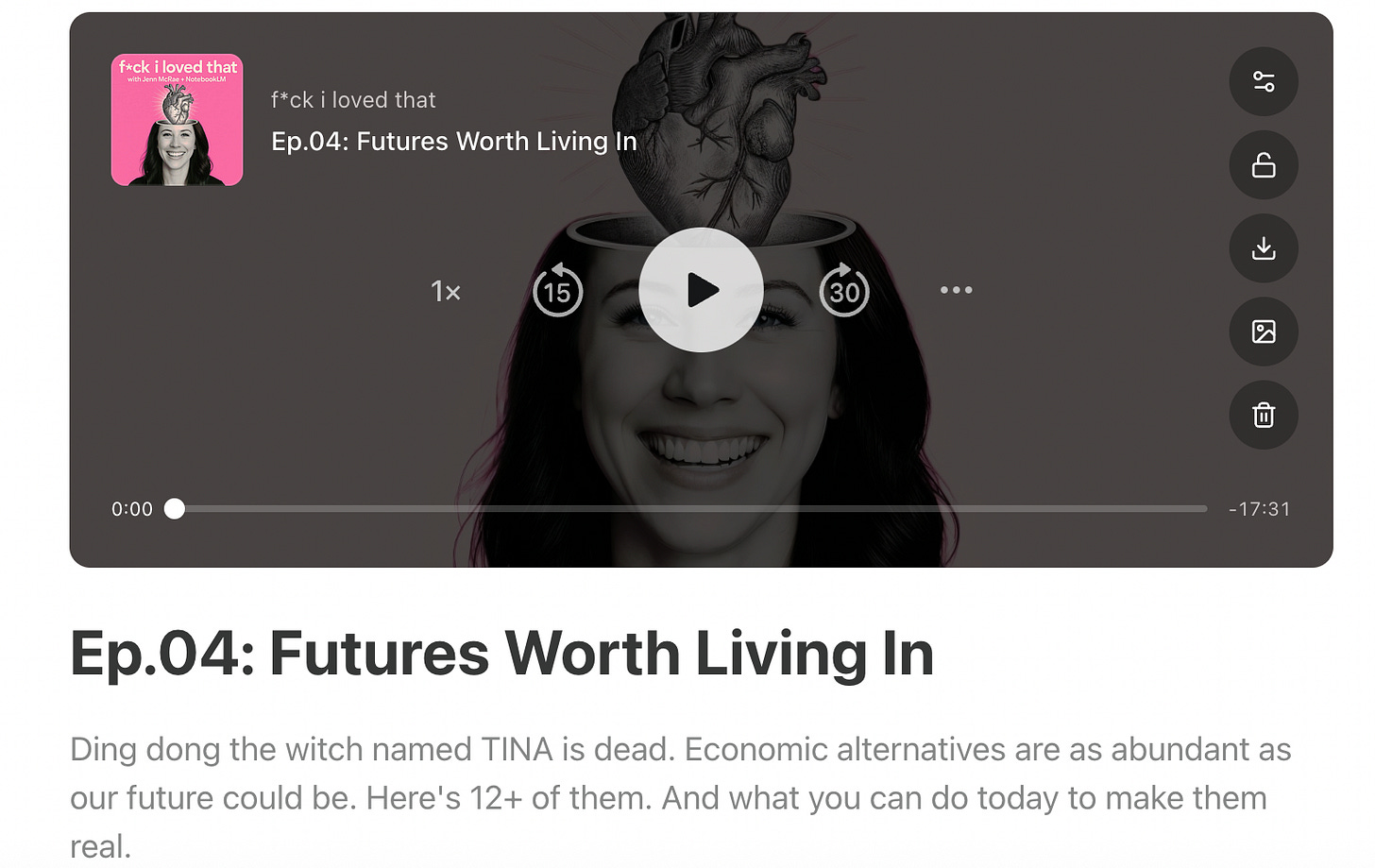More from f*ck i love you
the fily (audio)files audio essays | Spotify | Apple Podcasts
f*ck i loved that the pod | Spotify | Apple Podcasts



Start Here
The Welfare Queen Trilogy is a long form tale that zooms in, out, between and back from personal crisis to systemic crisis to our collective transformational crisis — and how we might get from here to futures worth living in.
Not everyone has time for long form pieces, and, I think this is a story worth knowing.
This is my effort to make it digestible and accessible.
A table of contents and additional ‘tl;dr’ content for each piece and the whole series follows this welcome note.
In addition to the text content of this post, you can listen to a ~20 min summary podcast produced by NotebookLM’s audio overview feature.
I use NotebookLM a lot, it is Google’s ‘research assistant’ AI, allowing you to upload almost any form of media into ‘notebooks’ with tools designed to query the sources a single dataset. Among other things, it can make 'deep dive’ summary podcasts of each notebook, which is how I produced this and how I produce my weekly podcast, f*ck i loved that.
This Friday (June 26th) our whole episode is dedicated to futures worth living in. It picks up where Welfare Queen part 3 leaves off, a deeper look at the ‘distributed, decentralized New Normal polyculture’ I posit comes next.
Contents
Pt. 1 TL;DR: Welcome to The Enshittocene, Where Indignity is By Design
Pt. 2 TL;DR: Meet The Architects of The Enshittocene
Pt. 3 TL;DR: You Are Here Now: The Quickening Enshittening at 89 Seconds to Midnight
Post Voiceover
If you — like me — prefer to listen, here’s me reading this post.
Big Three Series Takeaways
The three big things you’ll get from engaging with this trilogy.
1. The System Isn’t Broken — It’s Working Exactly as Designed
By walking you through personal, political, and historical landscapes, this series exposes how economic precarity isn’t accidental. It's engineered. You’ll learn that indignity is a feature, not a bug, of modern governance — and that being broke, sick, and tired is the business model.
Or, as fellow Substacker
calls it — summarized by my friend and colleague — The Crippling, The Crutches, The Casino, The Casket. First the system injures you, then it sells you the crutches (an expensive ways to try to recover), then you're thrown into the casino of health care… maybe you'll win - maybe not only to keep you alive as long as possible so you’ll keep spending timemoneyenergy ‘till the day you buy your casket.2. You Are Not a Failure — You Are a Statistic
If you’re barely hanging on, congratulations: you’re normal. The trilogy reveals how most of us are living on the knife’s edge by design — one crisis away from collapse, thanks to rigged systems and weaponized narratives. So stop blaming yourself for struggling in a rigged game you didn’t set up.
The consequences of this historical trajectory is painfully brought to life through the lens of knowledge work by fellow Substacker
in his recent viral piece, The Cult of Productivity is Breaking People.3. Collapse is Already Here — But So is the Map Out
This isn’t just doomscroll theater. The final part offers a conceptual escape plan: how to recognize collapse in real-time and what comes after if we dare to imagine something better. Transformation is already happening — the only question is who’s steering the wheel and who’s still watching reruns.
The Substackers working on this are too numerous to name, but episode 4 (out June 27th) of f*ck i loved that will be a tour of all the best thinking I can find on futures worth living in. I also found a sort of neo-spiritual-meets-evolutionary-psychology take on Part 3 in
‘s piece, WTF is The New Earth and What Does it Mean for You?TL;DR Summaries
Welcome to The Enshittocene, Where Indignity is By Design
I share my personal mental health crisis, which led to me quitting my job and realizing the intentional ineffectiveness of Canada's social support systems. Despite having MS and a psychiatric emergency, I found the process to apply for disability to be a "gauntlet of indignity," requiring university-level literacy and access to expensive professionals.
I highlight that welfare and disability payments are grossly insufficient for basic survival. The maximum provincial disability payment is $1483.50 per month, which is then taxed. Recipients are also subject to continuous means-testing and earnings exemptions that can lead to a 105% Marginal Effective Tax Rate, meaning working more often results in less actual income.
I introduce "The Precariat," a large portion of Canadians (over two-thirds) who are living paycheque-to-paycheque and are one unexpected bill or health crisis away from financial ruin. This challenges the illusion of a robust social safety net in Canada, suggesting that widespread precarity is a "design choice" rather than individual failing.
I argue that the indignities and systemic issues I faced are not accidental but are rooted in deliberate, decades-old policy decisions. I conclude that these systems are designed to enforce poverty, acting as "adversarial insurance companies" that prioritize private wealth over collective well-being.
This article sets the stage for Part 2 by posing the question of why the system is this way. I promise to reveal the "architects of the Enshittocene," a term coined by Cory Doctorow to describe the gradual deterioration of services due to profit-seeking.
Meet The Architects of The Enshittocene
This part reveals the "architects of the Enshittocene" and explains why public services are designed to be ineffective, linking personal struggle to political forces and historical policy decisions. I posit that our collective circumstances are "deliberately designed".
Ronald Reagan famously used Linda Taylor, the "Welfare Queen," as a scapegoat to stoke public rage against welfare recipients. He used exaggerated claims about her fraudulent earnings to gain political support for cutting social spending, deeply implanting a racially charged caricature into the collective psyche that still shapes public perception today.
Milton Friedman, a Nobel laureate and "granddaddy of Neoliberal Economics," is identified as the intellectual force behind this shift, advocating for a theoretical model of human nature called "Homo Economicus" – a perfectly rational, self-interested actor. His ideas, emphasizing individual liberty and free markets, became foundational for a sweeping policy agenda.
Reagan and Margaret Thatcher were deeply enamored with Friedman's ideas and spearheaded a joint project to dismantle the post-WWII Keynesian consensus. Their goal was to "liberate Homo Economicus" within everyone by removing perceived impediments to individual pursuit of prosperity, which they blamed for socioeconomic crises in the 1970s and 1980s.
They "weaponized culture" to shift "Overton’s Window" aggressively to the Right, demonizing dependency and promoting individualism, self-reliance, and free markets as the only solutions. This campaign, often prioritizing "corporate freedom" under the guise of "individual freedom," laid the groundwork for policies that would demonize disability and poverty as forms of dependence.
This "generational project" was continued by Bill Clinton and Tony Blair, who, despite being 'left of center,' implemented conservative agendas like NAFTA and the repeal of Glass-Steagall. These actions led to significant reductions in social support access and increased household debt, exemplifying "regulatory capture" and solidifying the Enshittocene.
You Are Here Now: The Quickening Enshittening at 89 Seconds to Midnight
I describe our current period as the "quickening enshittening," or the "fast part of collapse," marked by converging global crises, rising authoritarianism, and pervasive anxiety. This signals an epochal change where existing societal structures and cultural narratives are being remade.
I connect individual mental health crises to this collective societal breakdown, arguing that legacy systems are "literally strangling the life out of a majority of us". This is evidenced by rising mental health disability claims and widespread financial precariousness, positioning Millennials as "Homo Economicus’ precarious progeny" unfairly blamed for these consequences.
I introduce the concept of "Corporate Narcissism" to explain how legacy systems operate, optimizing for corporate gain and blaming individuals for systemic failures. This is linked to the "Alignment Problem" in AI, where artificial intelligence is trained on human values that prioritize "profit over people" and "scale over sanity," potentially leading to further chaos.
Drawing on Jared Diamond's 5-point framework for civilizational collapse, I illustrate how environmental damage, climate change, hostile neighbors, loss of trading partners, and ineffective responses to systemic problems are converging to signal current societal breakdown. This "herd of drunk elephants" is ignored by leaders focused on personal gain.
I emphasize that transformation, a fundamental shift to a "New Normal," is distinct from mere change and is possible through crisis, like a "controlled burn" rather than a "raging wildfire". The current moment offers a "plastic period" of heightened possibility where agency and choice matter in defining the outcome.
I propose decentralized power and "polyculture" (e.g., Indigenomics) as a "New Normal north star" to guide a generative future, moving beyond the "Capitalism OR Socialism" binary and rejecting Margaret Thatcher's "There Is No Alternative" (TINA) lie. This future involves many different, responsive ways of organizing society, analogous to mycelium and mushrooms, already existing in various forms.
Interactive Notebook
The ‘interactive notebook’ is hosted by NotebookLM.
You can query any of the pieces — of the series as a whole — via its chat feature in the notebook, here.
NotebookLM is also the AI I used to create the summary podcast embedded in this post.
***
If this piece lit up your brain and heart at the same time, sharing, liking, commenting or subscribing is Creator Speak for “fuck i love you, too”.
And let’s be honest this is still capitalism and this economy is shit (again) so I don’t use paywalls. If you’re in a good position and excited to
make a one-time or monthly contribution,
I’d be super grateful.
I’ll still fucking love you either way.
***

















Share this post